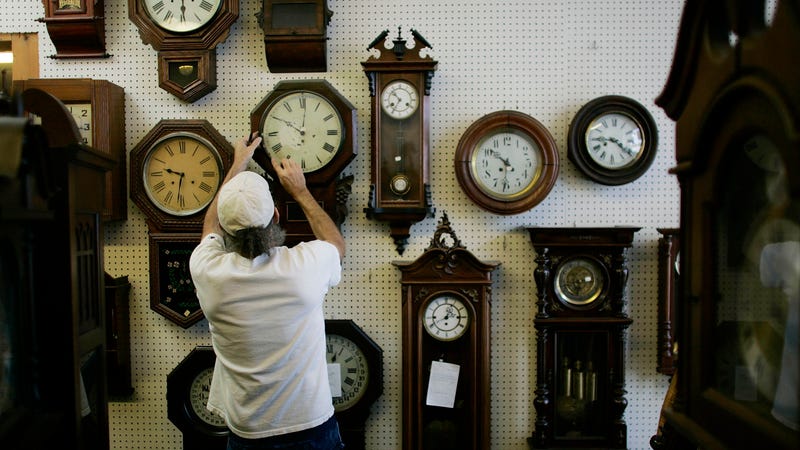 Mark Brown adjusts clocks on the wall at Brown?s Old Time Clock Shop March 6, 2007 in Plantation, Florida.Photo: Getty
Mark Brown adjusts clocks on the wall at Brown?s Old Time Clock Shop March 6, 2007 in Plantation, Florida.Photo: Getty
The European Commission is giving citizens of the European Union the opportunity to cast their vote in a public poll that could lead to the elimination of the sleep-depraving practice of changing clocks twice a year for the sake of daylight saving time.
The poll, spotted by The Verge, launched Thursday and running until August 16. During that time, members of the 28 European countries that recognize daylight saving time will be able to vote if they want to change the practice of turning back the clocks come winter and setting them forward to add an hour of evening sunlight in the summer.
The poll is sure to produce some polarizing results. A 2014 survey conducted by the European Commission found most EU member states were satisfied with the time changes, but there have been vocal groups of citizens who have pushed to eliminate the practice—especially in Finland, where more than 70,000 citizens signed a petition to abolish daylight saving time.
On the “keep it” side of the debate, there’s the suggestion that daylight saving time keeps us safer. Research published in The Review of Economics and Statistics found that when daylight saving time starts in the spring, robbery rates drop by an average of seven percent for the entire day—and 27 percent during the hour of extra sunlight during the evening. There’s also the belief that longer days in the summer provide more time for exercise and recreational activities, which may be good for health.
For those in opposition to continuing daylight saving time, there’s the fact that the original reason for instituting the practice has expired. The practice was first introduced by the Germans in World War I in an effort to save fuel for the war effort, but that concept doesn’t apply anymore. It actually drives up electricity demands, per the National Bureau of Economic Research.
There’s also some evidence to suggest even the arguments for daylight saving time are pretty weak. There’s essentially no change in the number of traffic accidents during daylight saving time, so roads aren’t any safer. As for health benefits, the extra hour of daylight may be negated by the fact that when the clocks spring forward, there’s a spike in the suicide rate and the number of recorded heart attacks. It also disrupts the circadian rhythms of humans, leading to lost sleep and potentially more long-term health effects.
The European Commission’s poll won’t necessarily dictate policy in the EU, but it will help lawmakers decide if it’s time to move away from daylight saving time. If early response is any indication, there is going to be a lot of opinions to pick over on the issue. The Commission’s servers have already crashed from people flooding to the poll.
[The Verge]